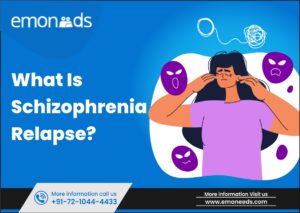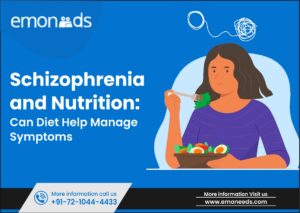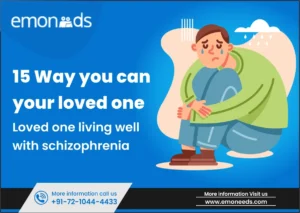Schizophrenia & Its Treatment Options
Schizophrenia & Its Treatment Options
Tue, 30 Jan 2024
Are you searching for a Schizophrenia treatment? Here at Emoneeds, we offer your world-class therapy for schizophrenia.
In modern-day medical understanding, schizophrenia has become quite a common term. It alters a person’s thoughts, emotions, and behaviors. It impacts their perception of reality. Its causes and manifestations vary. This makes it a challenging disorder to diagnose and manage. Understanding its multifaceted nature and available treatments is crucial for supporting the affected individuals. From identifying its diverse types and diagnostic methods to exploring treatment options and prognosis, delving into this condition sheds light on its complexities. Addressing the difficulties in managing schizophrenia underscores the importance of comprehensive care and support systems. Emoneeds offers pathways and resources aiming to empower individuals navigating the complexities of schizophrenia.
Table of Contents
ToggleWhat is Schizophrenia?
Schizophrenia can be simplified as a puzzling jumble in the brain. Imagine perceiving sights and sounds that aren’t real, such as elusive shadows, or deciphering hidden messages within TV static. People experiencing schizophrenia might hold beliefs that aren’t grounded in reality, like feeling constantly observed or possessing superhuman abilities. This disorder can lead to difficulty in clear thinking, where emotions might not align with actual events.
Causes of Schizophrenia
No one has yet pinpointed the exact reason causing schizophrenia. However, medical science has advanced and, with careful study, identified the triggers causing schizophrenia. It really presents a challenging landscape for researchers. This is due to its complicated nature. The causal factors encompass various elements:
Genetic Influence
Strong familial connections suggest a genetic basis for schizophrenia. While no single gene is solely responsible, multiple genes contribute in small ways, collectively amplifying vulnerability. These genes likely impact brain development and the functioning of neurotransmitters. Environmental factors can then potentially trigger this predisposition.
Brain Chemistry Disruptions
Our neurotransmitter levels are quite important when it comes to causing schizophrenia. A person can face the risk of developing schizophrenia if the levels become imbalanced. The two primarily responsible levels are dopamine and glutamate. In case there is an imbalance, the individual can experience hallucinations.
Developmental Impact
Events during prenatal or early childhood stages can significantly influence the risk of schizophrenia. Complications during birth or infections in infancy might shape brain function, potentially impacting vulnerability to the disorder later in life.
Environmental Triggers
While genetic and biological factors lay the groundwork, environmental elements often act as catalysts. For instance, stressful life events can be one major trigger. Substance abuse, particularly drugs like cannabis, can also increase the risk for individuals already predisposed to schizophrenia.
Understanding these interconnected factors is crucial for early identification. However, the exact cause of schizophrenia remains elusive due to its complexity. Still, unraveling these contributing components is pivotal. This will help improve outcomes and assist individuals in managing this condition effectively.
Types of Schizophrenia
There are several types of schizophrenia. Here are some of them-
Paranoid Schizophrenia
Delusions and paranoia are two of the primary features of this type of schizophrenia. Individuals may believe they are being persecuted or plotted against. Hallucinations, especially auditory ones, might accompany these beliefs. Despite these symptoms, cognitive functions and emotions can remain relatively intact.
Disorganized Schizophrenia
Disorganized speech and behavior define this type. Individuals may struggle to express coherent thoughts. They can exhibit erratic behavior and have trouble with daily activities. Their emotional responses also may not match the situation. Self-care might be significantly impaired.
Catatonic Schizophrenia
Here, extreme motor disturbances are observed. Individuals might display stupor (immobility and mutism), agitation, or unusual voluntary movements. Their ability to function independently may be severely compromised, requiring assistance with even basic activities.
Residual Schizophrenia
After a significant episode, individuals may enter a residual phase with milder symptoms. While hallucinations and delusions might reduce in intensity, they might persist to a lesser degree. Negative symptoms like reduced emotional expression or motivation may linger.
Undifferentiated Schizophrenia
This category encompasses symptoms that don’t fit neatly into any type. It might include a mix of various symptoms from different types. Hence, this type of schizophrenia is very difficult to understand.
How is Schizophrenia Diagnosed?
The diagnosis of schizophrenia is a nuanced process. It requires careful evaluation by mental health professionals. While there isn’t a single test to confirm its presence, clinicians rely on a comprehensive assessment. This assessment involves various elements.
Clinical Examinations
Individuals are interviewed extensively by mental health specialists. This strives to comprehend their feelings, behaviors, and thoughts. These discussions frequently include topics such as symptoms and their length, family history, substance use, and everyday functioning.
Diagnostic Criteria
To diagnose schizophrenia, clinicians refer to the DSM-5. This is a guide outlining specific criteria. According to this guideline, symptoms should be persisting for quite some time. And it should be impacting the person’s life. The person will be experiencing symptoms like hallucinations and delusions.
Physical Examining and Testing
Despite the fact that schizophrenia is essentially a mental health illness, medical evaluations are critical. Other medical diseases may be ruled out using physical exams and testing.
Reports and observations
Observations from family members, caretakers, or friends can provide useful information on an individual’s behavior. This assists physicians in understanding the scope and significance of the symptoms.
Duration and Influence
Diagnosis also entails determining the length of symptoms and how they affect other elements of life. This includes social, occupational, and personal performance.
The Rule-Out Procedure
The diagnosis approach also includes ruling out other mental health diseases that may mirror schizophrenia symptoms. This includes bipolar disorder or some kind of drug abuse-related psychosis.
What is the Prognosis for Schizophrenia?
The outlook for schizophrenia can differ greatly among individuals. Though it’s a long-term condition, spotting it early and getting treatment can make a world of difference. Some folks might have periods with few symptoms. At the same time, others might face more ongoing struggles.
Getting the right treatment, like medication, therapy, and support, is key for managing symptoms and making life better. But sticking with the treatment plan matters a lot for how things turn out. Plus, having support from friends and family, access to resources, and being in a positive setting can really affect how things go.
With the right kind of help, many people dealing with schizophrenia can still lead really full lives, keep up relationships, and work towards their dreams. Even though it’s tough, having the right attitude and support can make a difference. This difference, in turn, can help the person live a meaningful life.
Why is Treating Schizophrenia so Difficult?
It is not a surprise when people say that treating schizophrenia is difficult. The reason for this is because of several factors working together. One key problem is the condition’s unique nature. What works for one person may not work for another. Finding the proper drug and dose is a trial-and-error procedure. This is sometimes accompanied by adverse effects that dissuade patients from continuing therapy.
Furthermore, schizophrenia is much more than simply coping with symptoms. It’s about restoring life skills and overcoming social hurdles. Stigma and misunderstandings about the disease might impede access to support networks. This makes it more difficult for patients to obtain essential assistance.
Furthermore, there can be a lack of understanding of the condition. This may cause some people to discontinue therapy. The complicated nature of schizophrenia is why people are left confused with treatment options. This includes its biological, psychological, and social elements. Therefore, it necessitates a strategy that requires persistent and long-term treatment.
Treatment Options Available For Schizophrenia
Treating schizophrenia isn’t easy. However, there still exist options to help a person live with schizophrenia. Here are some options.
Medications
Special drugs called antipsychotics help with symptoms like hearing things or having strange beliefs. There are different types, but finding the right one without too many side effects can be tough.
Therapy
Talking with a therapist can help manage confusing thoughts. Also, involving family in therapy can create a supportive environment for getting better and staying well.
Support Groups
Being around others who understand can be helpful. Programs and groups can offer training and support for finding work or getting a place to live.
Healthy Living
Simple things like exercise, good sleep, and eating well can help someone feel better.
Technology Tools
Some new things, like phone apps or virtual reality, can be used alongside regular treatment to make things easier.
Mix of Treatments
Sometimes, using a mix of different treatments works best. Things like yoga, mindfulness, or art therapy can also help in reducing stress and coping better.
Is recovery possible?
- Recovery is not only possible but it is relatively common. The path to recovery is a struggle which is, often marked by relapses and ongoing adjustments to residual symptoms, functional difficulties, and altered life goals
- There is now a growing scientific literature demonstrating a more optimistic picture of the course of illness and providing the hope that recovery is possible in most of the cases.
Reason For Relapse
People with schizophrenia sometimes quit their medications because of side effects or not understanding their illness. Many times, individual experiences chronic anxiety due to uncertainties, day-to-day stressors of life and familial expectations. This raises the risk of serious symptoms returning, which can lead to a psychotic episode (in which someone loses touch with reality).
Why Emoneeds?
Because we support you in your journey to reduce your relapse and help you with lasting recovery by following provisions:
- Handling Medication Compliance.
- Long Term Support Throughout Your Mental Health Journey.
- Catching Early Warning Signs Through Daily Feedback.
- Daily Cognitive Remediation Activities.
- Helping You Manage Your Negative Core Beliefs And Chronic Anxiety Through Regular Sessions.
- Weekly Family Therapy Sessions
- Tailor made program.
How Can Emoneeds Help You Treat Schizophrenia?
At Emoneeds, a bunch of experts, like doctors, therapists, and other specialists, work together. They create special plans that cover not just the symptoms but also how someone feels and their relationships. These treatment plans are customized according to each individual’s needs so that the path to recovery is sooner.
At this place, they do different kinds of talking therapies. These are for managing symptoms, helping with making friends and feeling supported. There’s also therapy involving family members to create a nice atmosphere at home.
Emoneeds is like a main hub for all kinds of help. It’s made to help out people with different needs related to schizophrenia. So, it’s like a center that tries to make things better for everyone dealing with this condition.
Moreover, it is not just schizophrenia that Emoneeds can help with. They are well-trained and equipped to treat other mental conditions as well. With such high-quality care and service, lots of individuals suffering from schizophrenia have benefitted from their service.
Is recovery possible?
Our Reviews
I appreciate commitment to my mental health and the positive impact they’ve had on my life. I would highly recommend their services to anyone seeking a skilled and compassionate psychologist.” Yes, I can promote the EMONEEDS.
Neha Properties
Emoneeds has been a real lifesaver for me. Not just saying it, I mean it. Their process, the check-ins, and the super caring team have made a world of difference in my mental health journey. A+ service!
somasekhar reddy
Emoneeds, you guys are doing something special. Your approach to mental health, the custom plans, and the regular check-ins for my daughter, it’s been a support like no other. Keep doing what you’re doing!
Chikki Sukoon
Related Blogs
Looking for support? Visit our help center.
I appreciate commitment to my mental health and the positive impact they’ve had on my life. I would highly recommend their services to anyone seeking a skilled and compassionate psychologist.” Yes, I can promote the EMONEEDS.
Neha Properties
Emoneeds has been a real lifesaver for me. Not just saying it, I mean it. Their process, the check-ins, and the super caring team have made a world of difference in my mental health journey. A+ service!
somasekhar reddy
Emoneeds, you guys are doing something special. Your approach to mental health, the custom plans, and the regular check-ins for my daughter, it’s been a support like no other. Keep doing what you’re doing!
Chikki Sukoon






